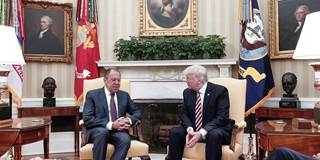Like telling a secret to a friend, sharing intelligence with an ally is an act of faith. By disclosing intelligence provided by a US ally to the Russian foreign minister and ambassador last week, President Donald Trump indicated that he cannot safely be trusted – and thus caused profound damage to US national security.
ATLANTA – Telling someone a secret is an act of faith. Sharing intelligence with an ally is no different. By disclosing intelligence provided by a US ally to the Russian foreign minister and ambassador in an Oval Office meeting last week, President Donald Trump indicated that he cannot safely be trusted – and caused profound damage to US national security.
Every intelligence relationship has its rules and regulations. But, while written agreements are often part of the protocol, intelligence sharing isn’t based on any fine print. Rather, it rests on mutual confidence built over years, including by protecting secrets each side acquires through hard and often dangerous work.
Trust between intelligence services is a perishable commodity; indeed, there is an implicit threat that a betrayal, or even a mistaken disclosure, can sever the relationship then and there. Last week, Trump risked precisely that, as he demonstrated to intelligence services around the world that he hasn’t got a clue what trust means.

ATLANTA – Telling someone a secret is an act of faith. Sharing intelligence with an ally is no different. By disclosing intelligence provided by a US ally to the Russian foreign minister and ambassador in an Oval Office meeting last week, President Donald Trump indicated that he cannot safely be trusted – and caused profound damage to US national security.
Every intelligence relationship has its rules and regulations. But, while written agreements are often part of the protocol, intelligence sharing isn’t based on any fine print. Rather, it rests on mutual confidence built over years, including by protecting secrets each side acquires through hard and often dangerous work.
Trust between intelligence services is a perishable commodity; indeed, there is an implicit threat that a betrayal, or even a mistaken disclosure, can sever the relationship then and there. Last week, Trump risked precisely that, as he demonstrated to intelligence services around the world that he hasn’t got a clue what trust means.